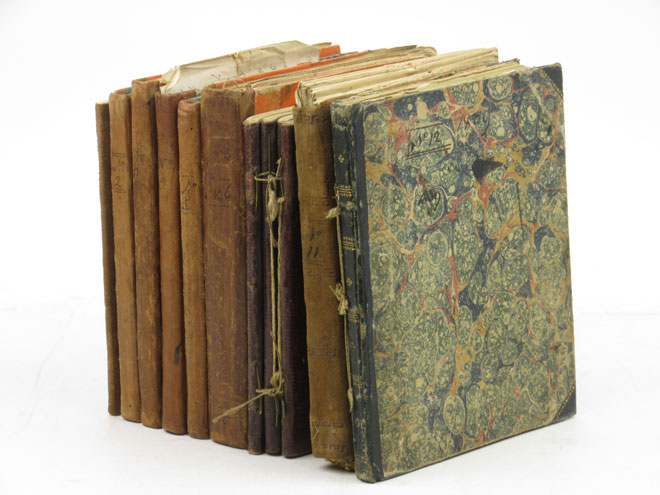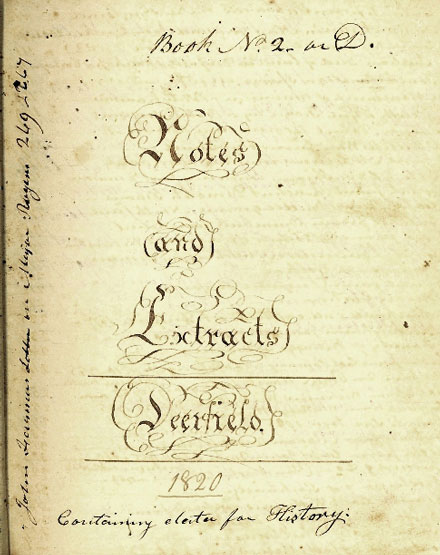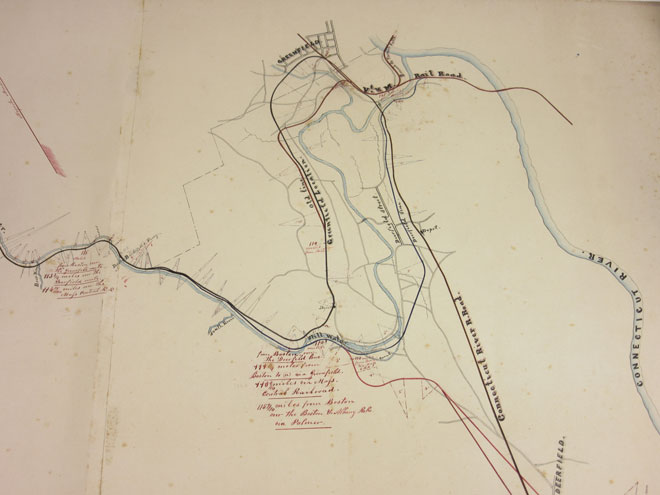A trove of 19th-century documents, consisting of journals, account books, maps, drawings, and notebooks, has recently been purchased at auction and will be available to researchers at the Memorial Libraries, Deerfield, Massachusetts. These manuscripts created by Epaphras Hoyt (1765-1850) and his son Arthur (1811-1899), have been in private hands until now and afford a new perspective on Deerfield’s history and the influence the Hoyts exerted on wider events.

Born in 1765 in the Old Indian House, the only residence within the stockade to survive the devastating 1704 French and Indian raid on Deerfield, Epaphras Hoyt became a leader in town and county affairs. Beyond holding numerous civic offices such as postmaster and justice of the peace, he worked as a surveyor, served as a general in the Massachusetts militia, wrote on military theory, the French and Indian wars, and the American Revolution, and contributed to the Medical and Agricultural Register(Boston) and the American Journal of Science (New Haven). His tenure as Sheriff of Franklin Co. is documented in an account book he kept between 1815 and 1831. Copies of speeches he made at anti-Masonic conventions are but one example of his involvement with the political life of western Massachusetts. Epaphras Hoyt was an avid reader and a keen observer of local and national events – all of which are reflected in his extensive journals.

Hoyt played an important role in the education of his nephew, Edward Hitchcock (1793-1864), a clergyman, professor, and the first Massachusetts state geologist before becoming President of Amherst College. Hoyt’s only son, Arthur, followed in his father’s footsteps by becoming a talented surveyor and civil engineer. Arthur inherited his father’s library of books and manuscripts, and amassed his own substantial library, all of which are recorded in a hand-written catalog that came as part of the papers acquired. The new materials document Arthur’s work as an engineer constructing the Rutland & Burlington Railroad, and the Central Massachusetts Railroad, and speak to the early development of regional transportation networks. A previously unknown c. 1830 manuscript map of the village of Deerfield and the contiguous north meadows drawn by Arthur was also purchased.

These materials will join Hoyt papers already in the Memorial Libraries that include surveying notebooks of both Epaphras and Arthur, journals, correspondence, legal documents, and books. Acquisition of these Hoyt documents was made possible in part through the generous support of Margaret E. C. Howland, Ann Lord, and a bequest from the estate of David Proper (1933-2014), former Librarian of the Memorial Libraries.
The Memorial Libraries, comprised of the book and manuscript collections of Historic Deerfield and the Pocumtuck Valley Memorial Association, is located at 6 Memorial St., Deerfield, MA. Hours are Tue.-Fri., 9:00-noon, and 1:00-5:00. Information regarding the collections can be found at: http://library.www.historic-deerfield.org, or: http://deerfield-ma.org/about/library/
Born in 1765 in the Old Indian House, the only residence within the stockade to survive the devastating 1704 French and Indian raid on Deerfield, Epaphras Hoyt became a leader in town and county affairs. Beyond holding numerous civic offices such as postmaster and justice of the peace, he worked as a surveyor, served as a general in the Massachusetts militia, wrote on military theory, the French and Indian wars, and the American Revolution, and contributed to the Medical and Agricultural Register(Boston) and the American Journal of Science (New Haven). His tenure as Sheriff of Franklin Co. is documented in an account book he kept between 1815 and 1831. Copies of speeches he made at anti-Masonic conventions are but one example of his involvement with the political life of western Massachusetts. Epaphras Hoyt was an avid reader and a keen observer of local and national events – all of which are reflected in his extensive journals.
Hoyt played an important role in the education of his nephew, Edward Hitchcock (1793-1864), a clergyman, professor, and the first Massachusetts state geologist before becoming President of Amherst College. Hoyt’s only son, Arthur, followed in his father’s footsteps by becoming a talented surveyor and civil engineer. Arthur inherited his father’s library of books and manuscripts, and amassed his own substantial library, all of which are recorded in a hand-written catalog that came as part of the papers acquired. The new materials document Arthur’s work as an engineer constructing the Rutland & Burlington Railroad, and the Central Massachusetts Railroad, and speak to the early development of regional transportation networks. A previously unknown c. 1830 manuscript map of the village of Deerfield and the contiguous north meadows drawn by Arthur was also purchased.
These materials will join Hoyt papers already in the Memorial Libraries that include surveying notebooks of both Epaphras and Arthur, journals, correspondence, legal documents, and books. Acquisition of these Hoyt documents was made possible in part through the generous support of Margaret E. C. Howland, Ann Lord, and a bequest from the estate of David Proper (1933-2014), former Librarian of the Memorial Libraries.
The Memorial Libraries, comprised of the book and manuscript collections of Historic Deerfield and the Pocumtuck Valley Memorial Association, is located at 6 Memorial St., Deerfield, MA. Hours are Tue.-Fri., 9:00-noon, and 1:00-5:00. Information regarding the collections can be found at the Historic Deerfield Library or PVMA Library.